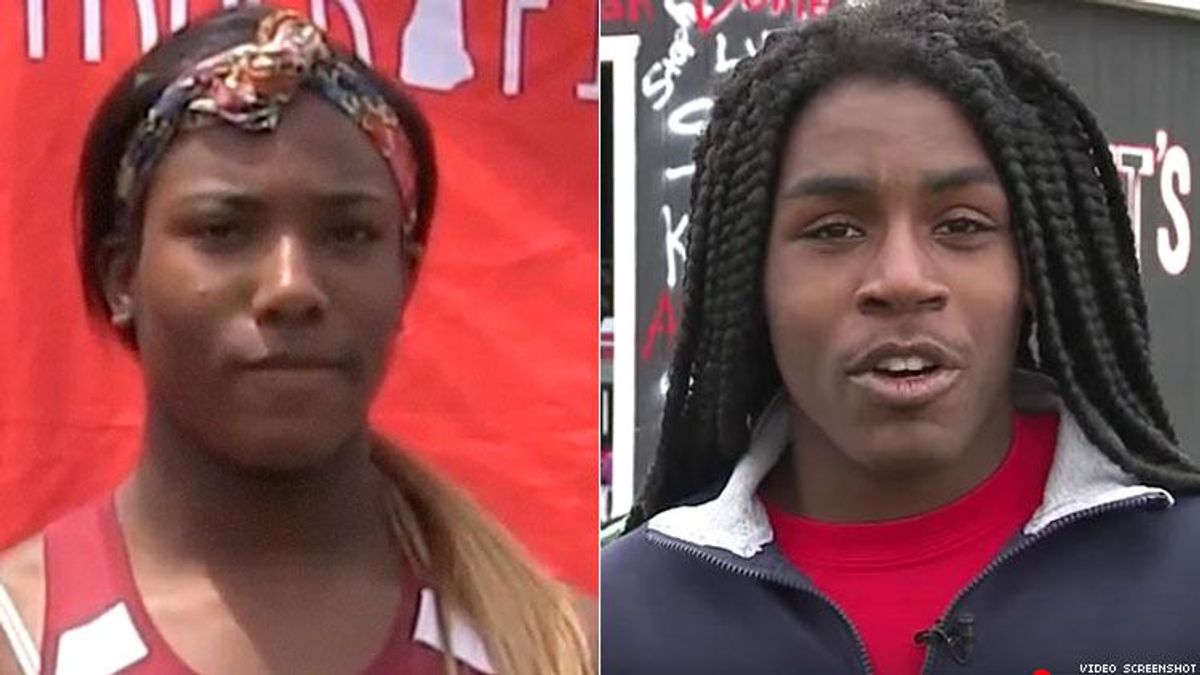The recent stellar performances of two transgender high school athletes in the Connecticut girls' track and field championships has some parents and student athletes contending trans girls shouldn't compete alongside cisgender girls.
Terry Miller, a sophomore from Bulkeley High School in Hartford, finished first in the 100- and 200-meter dash. Andraya Yearwood, a sophomore from Cromwell High School in Cromwell, was second in the 100-meter dash.
The showings of Miller and Yearwood added fuel to a controversy that had simmered since Yearwood's third-place finish in the 100-meter dash last year: whether or not transgender girls have an unfair advantage over cis female athletes.
"I think it's unfair to the girls who work really hard to do well and qualify for Opens and New Englands," sophomore sprinter Selina Soule told the Hartford Courant. "These girls, they're just coming in and beating everyone. I have no problem with them wanting to be a girl."
Two petitions now call for the Connecticut Interscholastic Athletic Conference, the governing body for high school sports in the state, to change its policy on transgender athetes, the Courant reports. The state allows trans student athletes to compete in gender-specific sports according to the gender with whith they identity. A petition started by Soule's mother, Bianca Stanescu, in Glastonbury urges the CIAC to make hormone therapy a requirement for transgender individuals who want to compete according to their gender identity. In Plainville, Jarmaine Lee, a father of two boys who compete in track, is circulating a similar petition.
The CIAC says its policy complies with state law, so to put in place the policy the petitioners seek, the law must change. The CIAC also says that athletes cannot try out for teams that do not match their on-record gender identity, and it requires school officials to not only confirm the athlete's gender identification but also verify that "that the expression of the student's gender identity is bona fide" and not for the sake of getting an unfair advantage in a gendered sport.
In order to prevent a student from claiming a gender identity for such a purpose, CIAC requires that after a transgender student athlete has updated their gender identity, "the determination shall remain consistent for the remainder of the student's high school sports eligibility."
Many take issue with the idea that trans athletes, particularly those who were assigned male at birth but identitfy as female, have an unfair advantage. "I understand that it appears to many people as an inequitable playing field, but they don't have any context or knowledge about how that athlete's life would be if she weren't transgender," Erin Buzuvis, director of the Center of Gender and Sexuality Studies at Western New England College, told the Courant. "And it would be possible she'd be beating their daughters if she was cisgender."
Myron Genel, a Yale University professor emeritus in pediatric endocrinology, said traits other than gender, in addition to training, factor in young athleses' success. "You cannot necessarily assume any one of these girls is succeeding because they have not fully converted their gender," he told the Courant. "I say this without knowing these kids, but it may have nothing to do with it."
Cyd Zeigler, the author of Fair Play: How LGBT Athletes Are Claiming Their Rightful Place in Sports and a cofounder of news website Outsports, said the petitioners focus solely on the "unfair advantages" transgender athletes supposedly have, while ignoring the many disadvantages they face.
"The way our entire society is designed, transgender people have inherent disadvantages everywhere they turn," Zeigler told ABC News. "They want to call these advantages unfair, as though if you're a cisgender person that any advantages that you might have over someone else are fair. But any advantages that a transgender athlete might possibly have are automatically deemed unfair. Why is that?"


















































































Fans thirsting over Chris Colfer's sexy new muscles for Coachella